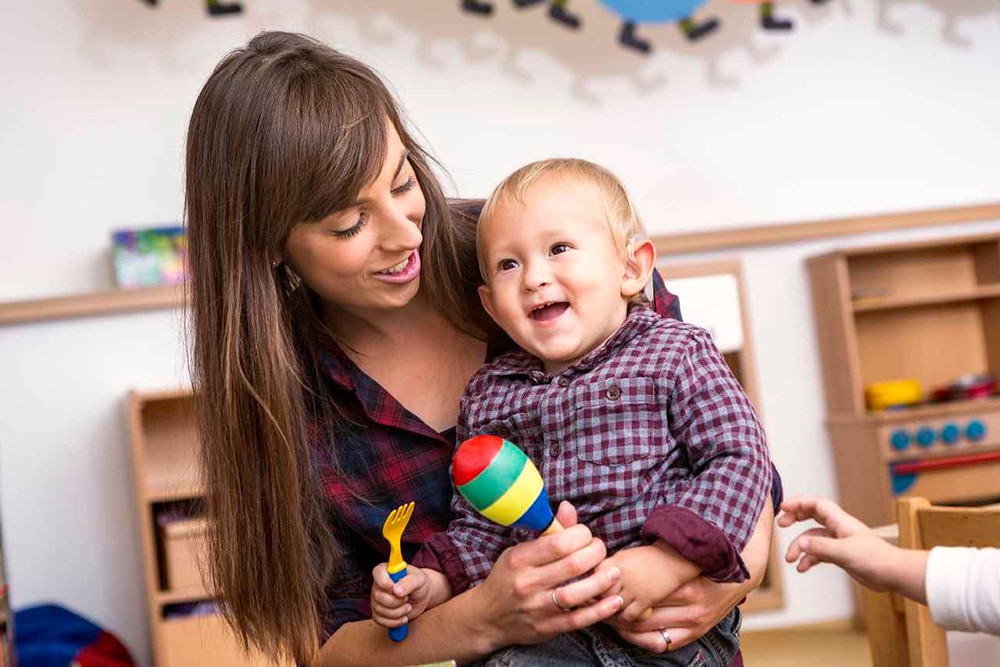MED-EL
Published Jul 01, 2016 | Last Update Mar 15, 2023
Hearing Earlier Can Mean Hearing Better

Early and meaningful exposure to sounds is the best way to help a child develop their listening and spoken communication skills.
Here’s why.
Hearing Develops Early in Life
If you’ve ever experienced pregnancy, you might know that a child can respond to sounds even before they’re born. That’s because their hearing system starts to form during gestation, and it continues to develop a lot during the first years of life.
But, the brain only develops the parts that are used. If a child isn’t able to hear sounds, it’s likely that their brain won’t properly develop the areas necessary for meaningfully interpreting sound.
For someone born with a significant hearing loss, sounds often won’t get to the part of the brain that is responsible for interpreting sound signals. So to develop their hearing, sound has to get sent to the brain through another way. For someone with severe or profound sensorineural hearing loss, that usually means receiving a cochlear implant.
If you’ve decided to have your child receive a cochlear implant, the question then is: when is the best time to get a cochlear implant?
Hearing Earlier is Better
Generally, earlier is better. For a child who gets their implant in the early years of life, they’ll be able to adapt to it at an age when a child would typically use sound to develop their listening, speech, and language skills.
If a child with a significant hearing loss receives a cochlear implant later in life, it’s possible that they’ll have missed hearing during the critical years in childhood when the brain is highly sensitive to developing auditory pathways, which are necessary for being able to understand sound signals sent by the cochlea.
If a child receives a cochlear implant earlier in life, their brain will have an opportunity to develop these auditory pathways during this time: a time that is closer to that of typical development.
This is shown through studies. In a study comparing children implanted before age 1 and children implanted after age 1, the earlier-implanted children performed better in a wide variety of tests. For example in open-set speech tests they had scores about 30—40 points higher, and in sentence understanding tests they scored almost 50 points higher.1
As a child gets older, their chances of having spoken language skills equal to their hearing-equivalent peers decreases when they don’t have adequate access to sound. A study that investigated 76 paediatric cochlear implant recipients found children who received their cochlear implant earlier had significantly larger vocabularies than those implanted later. For example, when tested after 32 months of hearing children who received their implant at 12 months had a vocabulary that was 25% larger than those who received theirs at 24 months of age. Even more, it suggests that those implanted after age 3 might experience great difficulties catching up with normal-hearing peers.2
Children Need Meaningful Exposure to Sound
But it’s not enough to just have received a cochlear implant. They need to use it in a constructive manner: they need lots of meaningful exposure to sound early in their life. The earlier they start hearing meaningful sounds, and the earlier they take part in in a hearing implant rehabilitation program, the more chances they have to build their listening and spoken language skills.
If it’s your child that has received a cochlear implant, there are lots of ways that you can help to give them the most meaningful exposure to sound. For example, use clear and age-appropriate language, natural repetition, and teach your child about the characteristics of what you’re talking about.
Then to get started with some specific tips and activities, check out these info-filled blog posts:
- Building your child’s vocabulary
- Help your child be a good listener and speaker
- 6 listening games to play with your baby
And check out these two real-life stories, from parents whose children have received cochlear implants:
Enter your email below to subscribe to the MED-EL blog to get even more great information like this, sent directly to your inbox!
This post was written with help from Joanna Brachmair, a rehabilitation specialist at MED-EL.
The minimum age for cochlear implantation may vary depending on where you live. For full information about regulatory approvals in your area, please contact your local MED-EL representative
References
- Lesinski-Schiedat, A., Illg, A., Heermann, R., Bertram, B., Lenarz, T. (2004) Paediatric cochlear implantation in the first and in the second year of life: A comparative study.
Cochlear Implants Int, 5(4):146-159 - Nicholas, J., Geers, A. (2007) Will they catch up? The role of age at cochlear implantation in the spoken language development of children with severe to profound hearing loss. J Speech Lang Hear Res, 50(4):1048-1062
MED-EL
Was this article helpful?
Thanks for your feedback.
Sign up for newsletter below for more.
Thanks for your feedback.
Please leave your message below.
Thanks for your message. We will reply as soon as possible.
Send us a message
Field is required
John Doe
Field is required
name@mail.com
Field is required
What do you think?
MED-EL


